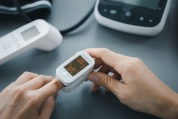Know your numbers! Get a quick reading of your CV risk.
Step into the CV Health Check area where a simple test will give you your risk for CVD. This test will not only give you a status on your own health, but help you learn more about the value of screening and what you can do to help implement this in your country. #CVHealthForAll
What is the CV Health Check?
The CV Health Check is located in the congress centre, next to the open stage.
It will be open on :
- Thursday from 08:30-16:30 (results available on Friday at 12:00)
- Friday from 08:30-12:30 (results available on Friday at 17:00)
- Saturday during congress hours, for result delivery only
Your health check will include several tests in two parts:
Blood pressure measurement

To ensure an accurate measurement you will need to have been resting for 10-15 minutes before the test, but there will be plenty to keep you entertained while you wait!
Blood draw
A blood draw will be performed to test for the following risk factors:
- Lipids: measures the level of fat (cholesterol and triglycerides) LDL (“bad cholesterol”) HDL (“good Cholesterol”) Triglycerides and Total Cholesterol.
- HbA1c: measures average blood glucose levels in the blood for the last 2-3 months (no need to fast!)
- Lp(a): is low density lipoprotein variant containing a protein called apolipoprotein(a). Genetic and epidemiological studies have identified Lp(a) as a risk factor for atherosclerosis and related diseases, such as coronary heart disease and stroke.
- High Sensitivity Troponin I (hs-TnI) is a biomarker that detects even minor heart muscle injury, aiding in early identification of cardiovascular risk and stratification. Elevated levels can indicate subclinical heart damage, even before symptoms appear.
- High Sensitivity C-Reactive Protein (hs-CRP) is a marker of inflammation that helps assess cardiovascular risk by identifying low-level chronic inflammation, a key factor in atherosclerosis. Elevated hs-CRP levels indicate a higher risk of heart disease and events.
- Serum creatinine is a key marker of kidney function, as elevated levels indicate impaired renal function, which is closely linked to increased cardiovascular risk. Chronic kidney disease can accelerate atherosclerosis and heart disease progression.
Your results
Your results will be available on Friday 4 April, from 12:00 or 17:00. You can come back at a time that is convenient for you on Friday or Saturday morning. A personal report card will be handed over to you.
Why a CV Health Check at ESC Preventive Cardiology?
CVD is the world’s number one killer but very few countries have a plan in place to tackle it. However many cardiovascular diseases are preventable.
Evidence shows that screening:
• supports early detection and diagnosis in health systems
• simplifies and streamlines diagnostic process for CVD prevention
• ensures clinicians can better support patients to adopt a proactive approach to heart health
That is why the ESC and EAPC are calling for policy makers to action ‘Cardiovascular & Diabetes Health Checks’ to be implemented in all countries as part of National Cardiovascular Health Plans. #CVHealthForAll
We need YOU to spread the word!
1. Share your experience
Show your support for investment in Cardiovascular Health Checks by sharing your experience on your social media channels using #CVHealthForAll. The more people who know screening is a quick and easy way to support prevention, the more policy makers will listen.
2. Sign the heart health petition
The cardiovascular community supports a global petition to prioritise heart health and call for national CV Health Plans. It takes two minutes to sign and every voice counts.
3. Know your CV numbers
Data supporting the need for screening as part of a wider Cardiovascular Health Plan is a great way to convince your institution, budget owners and policy-makers that screening saves lives. The ESC Atlas of Cardiology contains a wealth of country-specific data, easily downloadable graphs and charts that will support your advocacy efforts at home.
Call by the ESC Exchange Area to find out more data on your country's CV statistics.




 Our mission: To reduce the burden of cardiovascular disease.
Our mission: To reduce the burden of cardiovascular disease.